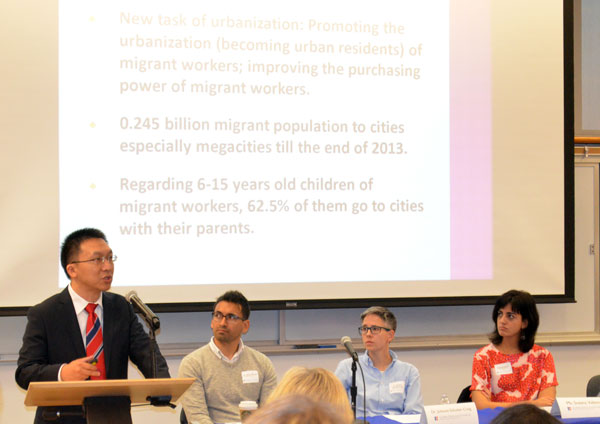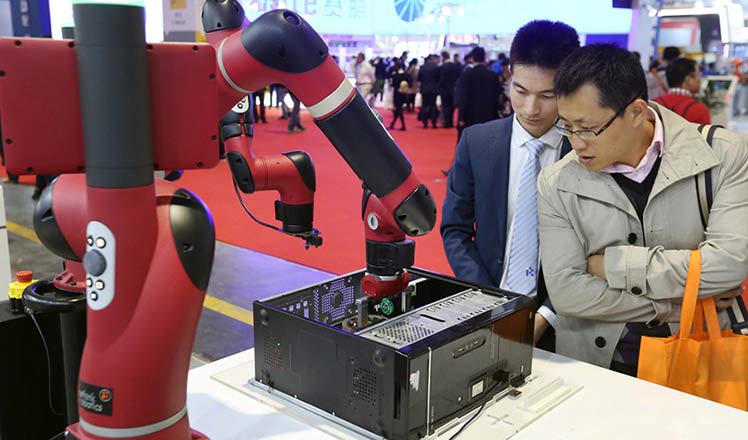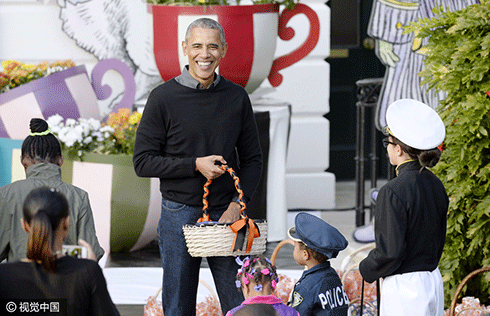Speaker details educational plight of 'left-behind' children
Updated: 2016-10-21 05:18
By China Daily in Washington(China Daily USA)
|
||||||||
 |
|
Yin Chengzhi (left), executive director of the Master’s of Development Practice Program and a public policy and management associate professor with Tsinghua University, talks about how urbanization influences the education of children in rural Chinese areas at the Global Education Forum held on Wednesday in American University in Washington. Other speakers included Jesus Cisneros (second from left), assistant professor of College Student Personnel Services and Administration at the University of Central Arkansas; Johanna Schuster-Craig (second from right), assistant professor of German and Global Studies at Michigan State University; and Suzana Velasco (right), a Brazilian journalist who currently researches Turkish migration in Berlin. Yuan Yuan / For China Daily |
Students at American University learned a relatively new term, "left-behind children", which refers to children in rural regions of China whose parents leave for urban areas as migrant workers.
The students were listening to Yin Chengzhi on Wednesday evening at the Global Education Forum at the university in Washington.
"I'm not a professional scholar in education," said Yin, executive director of the Master's of Development Practice Program and a public policy and management associate professor with Tsinghua University. "But through my research in urbanization and experience working with international students, education issues often come into play."
Since 2014, each semester the Global Education Forum has held a panel discussion of four to five experts in the field of education.
"We really want to bring together voices from other parts of the world that don't always come to a campus as often, hear perspectives about challenging issues in education globally and try to make connections across those," said Cynthia Miller-Idriss, associate professor of education and sociology and director of the Global Education Forum.
This semester's forum, Migration and Education, stressed educational problems in the context of migration.
Millions of people experience voluntary and involuntary migration within and between countries each year for reasons that range from the search for economic opportunities to a flight from warfare and violence.
The educational needs of migrants and of the communities they move to, represent one of the most pressing global challenges for education, according to the forum's flier.
Yin works primarily on urbanization and was invited to talk about how internal migration in China affects education.
"I wanted to have it not only be about refugees, but also about other issues that come up around the movement of people," Miller-Idriss said. "And because he works on urbanization, that seems to be a perfect fit. It's relatively rare that we get to hear the perspective of an expert from China."
Nearly 245 million Chinese from rural areas migrated to cities, especially megacities, until the end of 2013, and it's been reported that the new generation of migrant workers in China typically were born in the 1980s and 90s.
In general, they are not willing to go back to the rural areas, according to Yin.
"It means that the urban citizens cannot be ruralized. It's a one-direction migration," he said.
About 62.5 percent of migrant workers' children followed their parents to the urban areas, where they face difficulty entering the local schools.
Some cities are implementing policies to enable migrant workers' children to be enrolled in local schools, but in other cases, those children still do not qualify, Yin said.
In relatively wealthy cities like Shanghai, it's required that all children be educated fairly, while in other cities, migrant workers' children can only be enrolled with conditions through a so-called point system, he said.
"There is a huge-scale policy being implemented just a few days ago called residence card," Yin said. "It is intended by the central government to establish a nationwide new system to mitigate the difference between rural registration households and urban households.
"Generally speaking, it's intended to realize the full coverage of basic public services for all residents, including rural migrants with urban residence cards."
And residence cardholders' children may gradually, not immediately, be allowed to take the local senior high school entrance examinations and college entrance examinations, he said.
Left-behind children staying in the remote areas, often with their grandparents, suffer even more deeply from educational inequality.
"In the primary schools in the underdeveloped areas, although there are schools, they cannot provide necessary education, for instance, music, art and even physical training," Yin said. "That's I think the focus of the future developments."
Shannon Exley, a psychology student at the university, was unaware prior to the forum about the issues surrounding migration, let alone the separation of Chinese families due to the increase of parents working in the cities.
"I had very little knowledge of Chinese education before this," Exley said. "But afterwards, I have a better understanding of the issues surrounding internal migration and how they impact the quality of education of Chinese students."
For her, learning about the social issues around immigrant and migrant education helped with her study of bilingual education, because there are numerous cultural factors impacting bilingual education that exist outside school walls, she said.
Johanna Schuster-Craig, assistant professor of German and global studies at Michigan State University, also spoke at the forum, emphasizing language education.
"All of us have a need to pay attention to languages," Schuster-Craig said. "In a postindustrial world, language is the ticket to upper social mobility. Dominant language skills provide access."
China can always learn from Germany's and other countries' examples on prioritizing elementary education, Yin said.
"We need to go beyond knowledge education," he said. "There are more: quality education and even education of international visions, which is an emphasis in German elementary schools starting in the 19th century."
Other speakers were Jesus Cisneros, assistant professor at the University of Central Arkansas, and Suzana Velasco, a Brazilian journalist who currently studies Turkish migration in Berlin, touching on the education of undocumented immigrants in the US and Brazil.
"It's not so much that education itself is a global issue, but I think many of the themes and aspects of education are common across borders," Miller-Idriss said.
"Everyone around the world is concerned about how do we get children access to schools, how do we make sure that literacy rates are high, what models of education are best, and I think having exchanges where we compare and contrast differences and similarities only leads to more innovative solutions to common problems," she said.
Yuan Yuan in Washington contributed to the story
- France to begin moving migrant minors from Calais
- China-Japan ties growing but unstable: Premier
- Analysts to watch Alibaba's cloud computing, mobile results
- UN Security Council hails election of new president in Lebanon
- Regular China-South Asia freight train launched
- Police swoop on Paris migrant camp after Calais Jungle clearout

 Robots draw people to China International Industry Fair
Robots draw people to China International Industry Fair
 German international Miroslav Klose retires
German international Miroslav Klose retires
 Top 10 most influential Japanese cartoons in China
Top 10 most influential Japanese cartoons in China
 Opera performer who takes her shows to villages
Opera performer who takes her shows to villages
 13 most appealing cars in China in 2016
13 most appealing cars in China in 2016
 Obamas host White House Halloween for children
Obamas host White House Halloween for children
 China Fashion Week: Liu Yong Exclusive
China Fashion Week: Liu Yong Exclusive
 Top 5 collaborating countries in Belt and Road Initiatives
Top 5 collaborating countries in Belt and Road Initiatives
Most Viewed
Editor's Picks

|

|

|

|

|

|
Today's Top News
US election rhetoric unlikely to foreshadow future US-China relations
'Zero Hunger Run' held in Rome
Trump outlines anti-terror plan, proposing extreme vetting for immigrants
Phelps puts spotlight on cupping
US launches airstrikes against IS targets in Libya's Sirte
Ministry slams US-Korean THAAD deployment
Two police officers shot at protest in Dallas
Abe's blame game reveals his policies failing to get results
US Weekly

|

|








